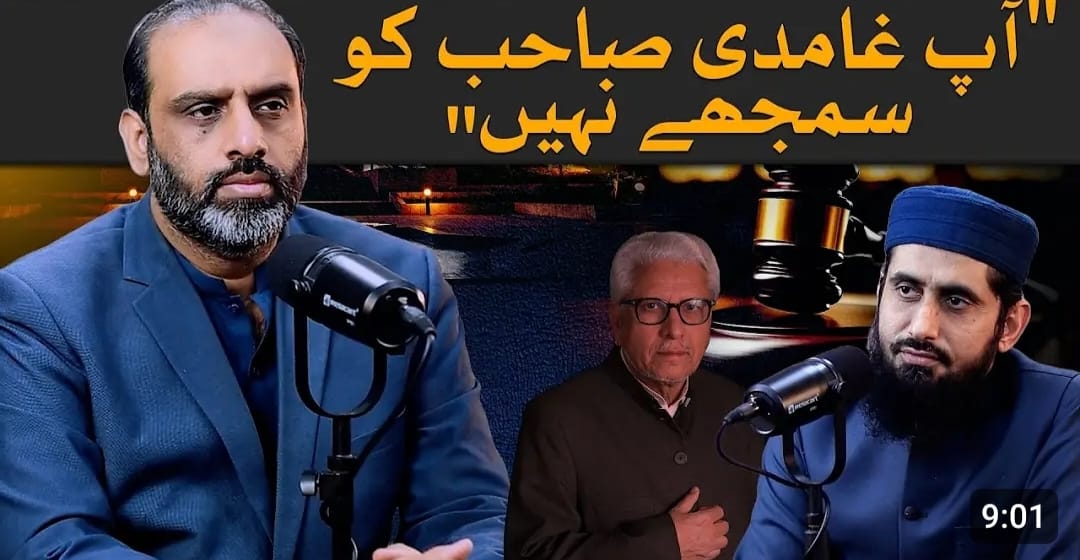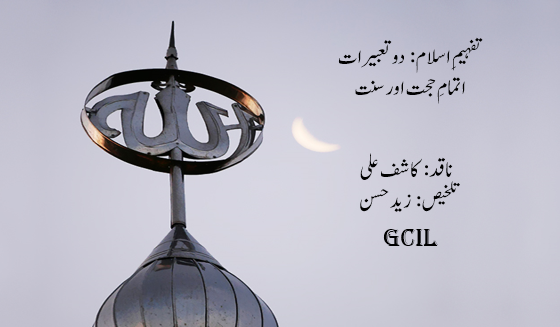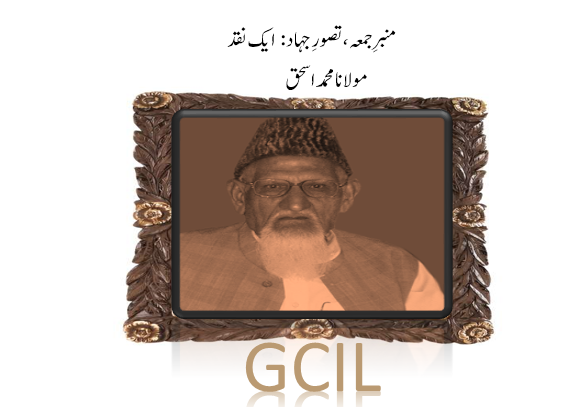ڈاکٹر حافظ محمد زبیر صاحب تلخیص : زید حسن اس ویڈیو میں سپیکر حافظ محمد زبیر صاحب نے " بعض افراد" کے اس دعوے کہ آپ کی تفہیمِ غامدی درست نہیں ، کو...


ڈاکٹر حافظ محمد زبیر صاحب تلخیص : زید حسن اس ویڈیو میں سپیکر حافظ محمد زبیر صاحب نے " بعض افراد" کے اس دعوے کہ آپ کی تفہیمِ غامدی درست نہیں ، کو...

ڈاکٹر نعیم الدین الازہری صاحب تلخیص : زید حسن رمضان المبارک کی بابرکت ساعات میں امتِ مسلمہ روزے اور عبادات میں مشغول ہے ، لیکن سوشل میڈیا پر چند...

مفتی طارق مسعود صاحب تلخیص : زید حسن مسئلہ پوچھا گیا ہے کہ کیا تراویح کی نماز یوٹیوب پر لگا کر اسکی اقتداء میں پڑھ سکتے ہیں؟یہ غامدی صاحب نے نیا...

مفتی طارق مسعود صاحب تلخیص : زید حسن غامدی صاحب نے یہ بات کی ہے کہ تراویح سرے سے کوئی نماز ہی نہیں ہے ۔ اور اسکی ابتداء حضرت عمر کے دور میں ہوئی ہے۔...

ناقد : کاشف علی تلخیص : زید حسن غامدی صاحب سے جزئیات پر بات نہیں ہو سکتی ۔ دین کی دو تعبیرات ہیں ۔ ایک تعبیر کے مطابق اسلام سیاسی سسٹم دیتا ہے ۔...

ناقد : مولانا اسحق صاحب تلخیص : زید حسن اول ۔ یہ کہنا کہ جمعہ کا منبر علماء سے واپس لے لینا چائیے کیونکہ اسلامی تاریخی میں جمعہ کے منبر کا علماء کے...
Islam and Nationality
[Written in response to criticisms of “Islam and the State — A Counter Narrative.”]
Colour, race, language, culture and civilization, and homeland—like religion—are among the significant grounds on which nations may be established. Through centuries of interaction, Muslims have now become a nation in this regard and express their nationality with full zeal and zest in the subcontinent, at least when facing any challenge.
Quaid-e-Azam Muhammad Ali Jinnah stated on this basis that the Muslims here are a distinct nation in all respects of international law, because compared to other nations, their civilization, culture, language and literature, arts and sciences, customs and traditions, mindset, demeanor, law, moral standards, and way of life—even their calendar and naming methods—all possess unique characteristics.*
Quaid-e-Azam’s statement was absolutely true and a statement of reality that no one can dispute. Therefore, I also did not dispute it, and nowhere in my counter narrative under the title “Islam and State” did I say that Muslims are not or cannot be a nation.
What I have stated is that it is not a demand of Islam or a command of its Shariah that the nationality of Muslims’ is Islam, hence all Muslims should be one nation. My critics are refuting something I have not said, and the refutation of what I have stated requires texts from the Quran and Hadith, which cannot possibly be provided in any way. Hence, Quaid-e-Azam’s speeches, Allama Iqbal’s poems, and the incidents from the Pakistan Movement have been deemed sufficient to prove a pure religious decree.
That the Muslims of the subcontinent constitute a nation is obvious. If someone says that mosques for Muslims have minarets and domes, who would deny it? It’s a statement of fact, but if they say it’s a demand of Islam and a command of its Shariah that mosques must have minarets and domes, then it’s every scholar’s duty to refute this notion and inform people that it is entirely baseless. A mosque can be a thatched hut or constructed by covering a boundary with the trunks and branches of date palms; Islam and Islamic Shariah have no objection to this.
I have fulfilled my duty by clarifying the correct understanding of Islam for the young people of my nation who are incited to engage in acts of terrorism under the claim that the existence of Arab, Iranian, Pakistani, or Afghan national identities among Muslims is entirely illegitimate; that their true nationality is Islam, and their system is the Caliphate, with no place for modern nation-states. According to this view, God’s land must be purified of such national identities.
I have informed them that engaging with a nation-state is not an act of blasphemy and that all the natural foundations of nationality can be as valid for Muslims as they are for any other nation. According to the Quran, the mutual bond among Muslims is not one of nationality but of brotherhood. Therefore, Muslims who have embraced the concept of territorial nationality and are living in America, Britain, Germany, France, or even India and Pakistan are not in violation of any command of Shariah.
.
The sources of Islam are completely devoid of any principle that the basis of nationality in Islam is Islam itself. If, during the time of the Pakistan Movement, Muslims insisted they were a distinct nation as against the Hindus and demanded a separate country for themselves based on this, there was nothing wrong in it. And if they proclaimed Pakistani nationality for themselves the very next day after Pakistan was formed, even then there was no objection from the perspective of religion and Shariah.
From a political point of view, someone might say that, in their opinion, the stance of Maulana Abul Kalam Azad or Quaid-e-Azam Muhammad Ali Jinnah was right or wrong, and we can agree or disagree with it. But religiously, there’s no objection to either of their positions. Hence, Quaid-e-Azam never raised any objection in this regard to Maulana Abul Kalam Azad’s stance.
Quaid-e-Azam’s argument was not that living with Hindus as one nation based on shared homeland was impermissible according to Islam or Islamic Shariah. Rather, his stance was that, to protect the culture, economy, social customs, and religious traditions of Muslims from the dominance of a Hindu majority, a separate country was necessary. His demand was based on the assertion that Muslims constitute a nation in every respect under international law, and that every nation has the right to seek a separate country in regions where it forms a majority.
This is my stance on the issue. Everyone has the right to criticize it, but with utmost respect, I suggest that before criticizing anything, some time should also be spent in understanding it.
[2015]
:Endnotes
All quality educational content on this site is made possible only by generous donations of sponsors like you. In order to allow us to continue our effort, please consider donating whatever you can!
We work day in and day out to produce well-researched, evidence based, quality education so that people may gain the correct understanding of their religion. But our effort costs a lot of money! Help us continue and grow our effort so that you may share in our reward too!
Supremacy of the Parliament [Written in response to criticisms of "Islam...
Islam and Nationality [Written in response to criticisms of "Islam and...
Caliphate [Written in response to criticisms of "Islam and the State: A...